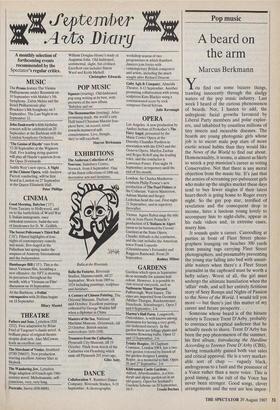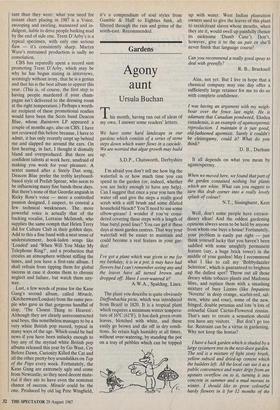Pop music
A beard on the arm
Marcus Berkmann
You find out some bizarre things, trawling innocently through the sludgy waters of the pop music industry. Last week I heard of the curious phenomenon of beards. Not, I hasten to add, the unhygienic facial growths favoured by Liberal Party members and polar explor- ers, and inhabited by countless millions of tiny insects and incurable diseases. The beards are young photogenic girls whose job is to escort male pop stars of more exotic sexual habits than they would like the News of the World to find out about. Homosexuality, it seems, is almost as likely to wreck a pop musician's career as voting Conservative. Not that there is any moral objection from the music biz. It's just that the armies of screaming pre-pubescent girls who make up the singles market these days tend to buy fewer singles if their latest heart-throb is going home to Roger every night. So the gay pop star, terrified of revelation and the consequent drop in income, hires a luscious young lovely to accompany him to night-clubs, appear in his rude videos and, in extreme cases, marry him. It sounds quite a career. Canoodling at parties in front of Fleet Street photo- graphers lounging on beaches 300 yards from passing tugs carrying Fleet Street photographers, and presumably preventing the young star falling into bed with unsuit- able waiters when there's a Fleet Street journalist in the cupboard must be worth a hefty salary. Worst of all, the girl must undergo the ultimate humiliation when the `affair' ends, and sell her entirely fictitious story of Sexy Romps and Nights of Passion to the News of the World. I would tell you more — but there's just this matter of my career and future prosperity.. .
Someone whose beard is of the hirsute variety is Terence Trent D'Arby, probably to convince his sceptical audience that he actually needs to shave. Trent D'Arby has been the pop phenomenon of the summer, his first album, Introducing the Hardline According to Terence Trent D'Arby (CBS), having remarkably gained both vast sales and critical approval. He is a very market- able sort of chap — vaguely black, androgynous to a fault and the possessor of a Voice rather than a mere voice. This is good timing, as the cult of the Voice has never been stronger. Good songs, clever arrangements and the rest are less impor- tant than they were: what you need for instant chart placing in 1987 is a Voice, swooping and swirling, mannered and in- dulgent, liable to drive people barking mad by the end of side one. Trent D'Arby's is a typical specimen, with only one serious flaw — it's consistently sharp. Martyn Ware's restrained production is sadly no consolation.
CBS has reputedly spent a record sum promoting Trent D'Arby, which may be why he has begun stating in interviews, seemingly without irony, that he is a genius and that his is the best album to appear this year. (This is, of course, the first step to having people murdered if your cham- pagne isn't delivered to the dressing room at the right temperature.) Perhaps a worth- ier recipient of these promotional readies would have been the Scots band Deacon Blue, whose Raintown LP appeared a couple of months ago, also on CBS. I have not reviewed this before because, I have to admit, it has only recently crept up behind me and slapped me around the ears. On first hearing, in fact, 1 thought it dismally bland and overproduced. But there are confident talents at work here, unafraid of making you work for your pleasure. A sextet named after a Steely Dan song, Deacon Blue prefer the trebly keyboard- based style of Prefab Sprout, who seem to be influencing many fine bands these days. But there's none of that Geordie anguish in Ricky Ross's voice — more a controlled passion designed, I suspect, to conceal a few technical weaknesses. The more powerful voice is actually that of the backing vocalist, Lorraine McIntosh, who supplies the same oomph that Helen Terry did for Culture Club in their golden days. Add to this a fine band with a neat sense of understatement, hook-laden songs like `Loaded' and 'When Will You Make My Telephone Ring?', and a production that creates an atmosphere without stifling the tunes, and you have a first-rate album. I shall refrain from tipping them for global success in case it dooms them to chronic neglect and failure, but watch them any- way.
Last, a few words of praise for the Kane Gang's second album, called Miracle, (Kitchenware/London) from the same peo- ple who gave us that gorgeous handful of slop, 'The Closest Thing to Heaven'. Although they are clearly unreconstructed soul boys, this nonetheless manages to be a very white British pop record, typical in many ways of the age. Which could be bad news if you have been unlucky enough to buy any of the myriad white British pop albums released this year by Go West, Cry Before Dawn, Curiosity Killed the Cat and all the other pretty-boy soundalikes on Top of the Pops every week. Fortunately, the Kane Gang are extremely ugly and come from Newcastle, so they need decent mate- rial if they are to have even the remotest chance of success. Miracle could be the one. Produced by old lag Pete Wingfield, it's a compendium of soul styles from Gamble & Huff to Eighties funk, all filtered through the rain and grime of the north-east. Recommended.











































 Previous page
Previous page